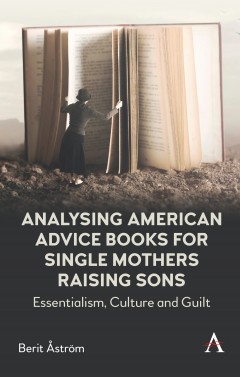Analysing American Advice Books for Single Mothers Raising Sons
Essentialism, Culture and Guilt
By Berit Åström
- About This Book
- Reviews
- Author Information
- Series
- Table of Contents
- Links
- Podcasts
About This Book
Although single fathers as primary carers are on the rise, most single-parent households in the United States are headed by women. These women are a lucrative market for parenting books and most of such books are aimed at single mothers raising sons. This intersectional study analyses a broad range of material: books written by female and male authors, African-American and white, health professionals as well as lay people, outspokenly feminist or traditionally conservative, addressing a middle-class or a working-class readership. This allows for a comprehensive analysis of normative attitudes towards parenting, showing how class and ethnicity interact with traditional assumptions of gender and biology to produce a genre of literature that is quite restrictive, perpetuating ideas of ‘intensive mothering’.
Situating these advice books within the context of parenting experts, the US fatherhood movement, the so-called ‘boy crisis’, cultural prejudice towards single mothers and what has been termed ‘neurosexism’ and ‘neuroparenting’, this study analyses the way in which the books draw on mother-blame language, misconceptions of neuropsychological research and traditional conceptualisations of masculinity and femininity to convince the mother readers that they are unable to raise a son to be a man. Using prescriptive and often alarmist language, the authors privilege traditional assumptions of gender, hegemonic masculinity and heteronormative family structures over single parent families, same-sex parenting and single mothers by choice (via adoption or ART). In doing so, the books afford very narrow parenting roles, for fathers as well as mothers, as well as a very limited range of masculine identities for young boys. Presented as common sense advice, these books are widely read by women seeking support and it is thus vital that they be interrogated for the way they continue to construct, shape and influence expectations on parenting, as well as the identities of young boys.
Reviews
“BeritÅström’s book is a beautifully crafted, cogent and intersectional critique of the heteronormative, racist, middle-class and essentialising ideas about parenting and gender in American advice books aimed at single mothers who are raising sons. It’s a critical call for the recognition of diversities, heterogeneities and complexities of contemporary families, parenthood and childhoods” — Andrea Doucet, Canada Research Chair in Gender, Work and Care, Professor of Sociology and WGST, Brock University, Canada.
“Examining expert literature directed towards single mothers in America (and particularly those raising sons), she shows how the advice rests upon raced, classed and gendered ideals about the family form. For these mothers in particular [however], there is the added sting that however hard they work at their parenting, they will never be able to make up for the ‘lack’ of a father figure, a fact which has important implications for their own subjectivities – as well as for conversations about social reproduction more broadly” — Dr Charlotte Faircloth, Associate Professor of Social Science, UCL Social Research Institute, UK.
“This is an original and insightful book and an excellent addition to the field of motherhood studies. While the focus is on advice books for single mothers, the study also contributes significantly to the understanding of motherhood more generally. Åström’s intersectional approach provides wonderfully rich and varied detail on the constructions of motherhood”— Jenny Björklund, Professor of Gender Studies, Centre for Gender Research, Uppsala University, Sweden.
Author Information
Dr Berit Åström is an associate professor at the Department of Language Studies, Umeå University, Sweden. Her main research field is motherhood studies.
Series
Table of Contents
Introduction: Childcare and Advice in Times of Change; Gender: Borderwork, Science and the Dangerous Mother; Class and Race: Expectations of Mothers and Sons; Reinstating the Father: Fathers in Advice Books for Mothers; Conclusion; Appendix; Notes; Bibliography; Index
Links
Stay Updated
Information
Latest Tweets



